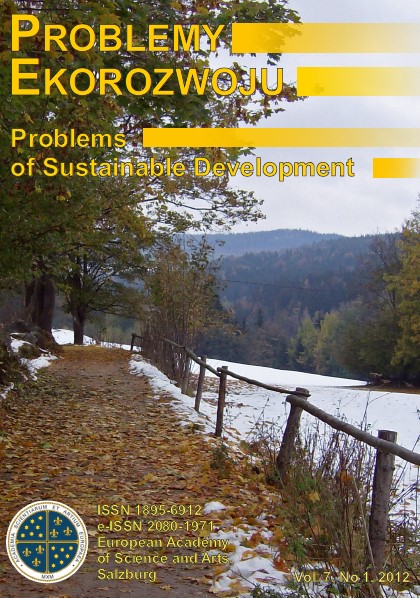Future prospects of Industrial Ecology as a Set of Tools for Sustainable Development
Article Sidebar
Issue Vol. 7 No. 1 (2012)
-
Genealogy of Ecophilosophies
Michael S. Pak7-13
-
Justice and Accountability as a Basis for Sustainable Development – the Case of International Environmental Law
Piotr Krajewski15-31
-
Sustainable Development and the Values we Share – Sustainability as the Confluence of Islamic and Western Frameworks
Paweł Bernat15-31
-
Social Marginalisation vs. Sustainable Development – Case of Homelessness
Paweł Rydzewski43-59
-
EURO 2012 vs. Sustainable Development
Zbigniew M. Karaczun61-75
-
Future prospects of Industrial Ecology as a Set of Tools for Sustainable Development
G Venkatesh77-80
-
A Novel Approach to Evaluating Sustainable Development
Zoran Radojicic, Sonja Isljamovic, Natasa Petrovic, Veljko Jeremic81-85
-
Determination of the Ecological-Economic Degree of Development in Countries of SE Europe – Weight Coefficients Technique
Mirjana Golušin, Olja Munitlak Ivanović, Larisa Jovanović, Siniša Domazet87-93
-
Henryk Skolimowski’s Ecophilosophy in the Aspect of Philosophy of History
Leszek Gawor95-103
-
The Jevons Effect and the Consumption of Energy in the European Union
Dariusz Pieńkowski105-116
-
Natura 2000 – the Opportunities and Dilemmas of the Rural Development within European Ecological Network
Artur Bołtromiuk117-128
-
Communiques of the State Environmental Council of Poland
EEAC annual conference 15-17 September 2011: Wroclaw, PolandTomasz Winnicki131-138
Archives
-
Vol. 9 No. 2
2014-07-01 16
-
Vol. 9 No. 1
2014-01-02 19
-
Vol. 8 No. 2
2013-07-01 13
-
Vol. 8 No. 1
2013-01-02 12
-
Vol. 7 No. 2
2012-07-02 14
-
Vol. 7 No. 1
2012-01-02 12
-
Vol. 6 No. 2
2011-07-01 19
-
Vol. 6 No. 1
2011-01-03 18
-
Vol. 5 No. 2
2010-07-01 21
-
Vol. 5 No. 1
2010-01-04 16
Main Article Content
Authors
venkatesh.govindarajan@ntnu.no
Abstract
From thought to action, ideas to implementation… that is the way to go. Industrial ecology as a set of tools and strategies to shape the world of the future and enable it to develop sustainably, needs to adjust and evolve over time. There is often a risk of having to rob Peter to pay Paul which must be minimized. The wheels-within-wheels nature of sustainable development needs to be appreciated and accepted in advance, even if one may agree that it would be difficult to please everyone equally. Something’s gotta give, as they say, for something else to stay.
Industrial ecology as a field of education and research is in its teens now, raring to go. In the days to come, even as it entrenches itself as a mature discipline in university campuses across the world, it is vital and extremely necessary to ensure that the links to society, government and industry are strengthened and researchers in this discipline do not become ivory-tower idealists dishing out theories ad infinitum, which do not have any relevance to ground realities.
Keywords:
References
ALLENBY B., Industrial Ecology – Policy Framework and Implementation, Prentice Hall, New York 1999.
ELKINGTON J., 1994, Towards the sustaina-ble corporation: Win-win-win business Stratetegies for sustainable development, in: Califo-rnia Management Rev. vol. 36 no 2, p. 90-100.
GUHA R., 1992, Prehistory of Indian Enviro-nmentalism – Intellectual Traditions, in: Economic and Political Weekly 27 (I,3), p. 57-64.
GRAEDEL T., ALLENBY B. Industrial ecology, Prentice Hall, New York 2003.
KEITSH M. M., 2011, Ethics in industrial ecology, in: Problemy Ekorozwoju/Problems of Sustainable Development vol. 6 no 2, p.19-31.
PAWŁOWSKI A., 2009, The Sustainable Development Revolution, in: Problemy Ekorozwoju/ Problems of Sustainable Development, vol. 4, no 1, p. 65-76.
REDLICFT M.R., 2009, Sustainable Development (1987-2005), an Oxymoron Comes of Age, in: Problemy Ekorozowju/ Problems of Sustainable Development vol. 4, no 1, p. 33-50.
VENKATESH G. Industrial Ecology: Has it arrived? http://www.eco-web.com (January 2007).
VENKATESH G., 2010, Triple bottom line approach to holistic individual and global sustainability, in: Problemy Ekorozwoju/Problems of Sustainable Development, vol. 5 no 2, p. 29-37.
VENKATESH G., 2011, Interpreting sustainability using Pirsig’s levels of quality, in: Problemy Ekorozwoju/Problems of Sustainable Development vol. 6 no 2, p. 63-66.
VENKATESH G., 2011a, Moving along the triple bottom line, in: Logistics Insight Asia, TenAlps Asia, Singapore, March.
Article Details
Abstract views: 52
License

This work is licensed under a Creative Commons Attribution-ShareAlike 4.0 International License.


